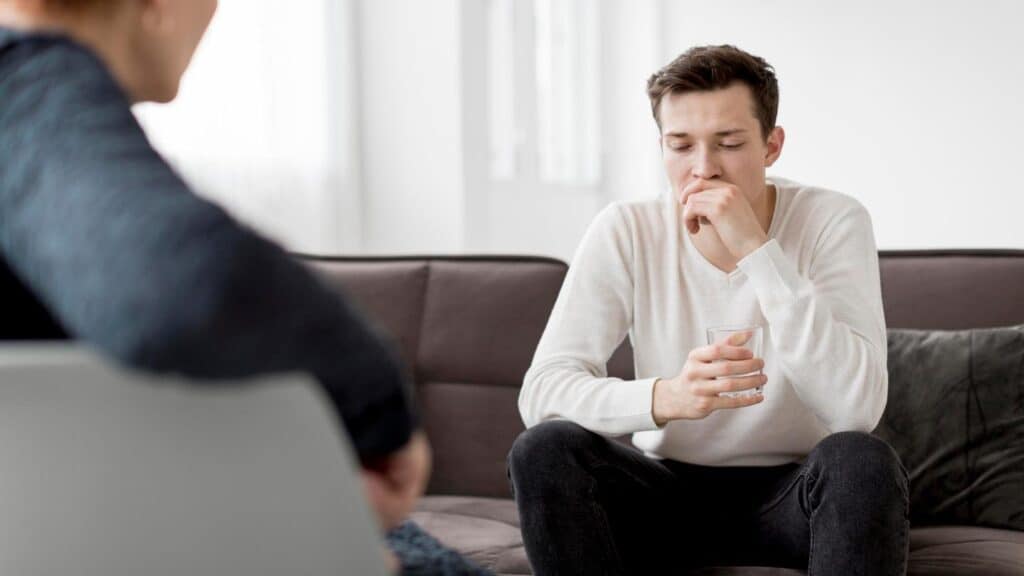Anxiety can creep into our lives, creating invisible barriers that hinder our ability to function at our best. It affects our work, relationships, and overall sense of well-being, often leaving us feeling isolated and overwhelmed. At The Lovett Center, we understand the profound impact anxiety can have, and we’re dedicated to providing effective anxiety treatment in Houston.
Anxiety disorders encompass a range of mental health conditions that cause excessive fear or worry. Unlike the occasional anxiety experienced during significant life events, anxiety disorders are persistent and can significantly impair an individual’s ability to function daily. Moreover, these conditions trigger the presence, or anticipation, of certain situations or objects, leading to a disproportionate emotional response.
According to a report by Forbes, anxiety in the U.S. is significant, affecting over 40 million adults, or about 19.1% of the population annually. These disorders can significantly impact individuals’ daily lives. Despite their prevalence, many people with anxiety do not receive appropriate treatment.
Types of Anxiety Disorder
Anxiety disorders can manifest in various forms, each with unique features:
- Generalized Anxiety Disorder (GAD): Characterized by chronic anxiety, exaggerated worry, and tension, even when there might be little or nothing to provoke it.
- Panic disorder: Involves spontaneous seemingly out-of-the-blue panic attacks and is preoccupied with the fear of a recurring attack.
- Phobia-related disorders: These involve a severe fear or aversion to specific objects or situations that are, in reality, relatively harmless.
Each type of disorder requires a specific approach tailored to the needs of the individual. Thus, an approach that The Lovett Center is well equipped to provide. Here in Houston, we focus on understanding the intricacies of each condition. Hence, we ensure our clients receive the personalized care necessary to manage and overcome their anxieties.
 Common Symptoms of Anxiety
Common Symptoms of Anxiety
Understanding the symptoms of anxiety is crucial for identifying and initiating the proper treatment, especially when considering anxiety treatment in Houston at facilities like The Lovett Center.
Physical Symptoms
Several physical manifestations indicate anxiety. These include:
- Increased heart rate: Anxiety often causes the heart to race, which individuals might perceive as skipped heartbeats.
- Excessive sweating: During anxious episodes, sweating increases due to the body’s heightened state of alertness.
- Trembling: Shaking or trembling is a common physical reaction to intense anxiety.
- Difficulty breathing: Shortness of breath can occur, making it feel tough to take a deep breath.
- Fatigue: Despite potentially high energy levels during an anxious episode, individuals frequently experience profound fatigue afterward.
Emotional Symptoms
Anxiety also affects emotions significantly. Some emotional symptoms are:
- Persistent worry: Ongoing, excessive worry about various things characterizes generalized anxiety disorder.
- Agitation: When anxious, individuals may feel unusually agitated or irritated.
- Difficulty concentrating: Anxiety can disrupt focus, making it hard to concentrate on tasks.
- Irrational rears: Specific anxiety disorders cause intense, irrational fears about particular situations or objects.
- Feelings of dread: A constant sense of impending danger or panic is prevalent among those with anxiety disorders.
Behavioral Symptoms
Behavior patterns may also change due to anxiety:
- Avoidance: Individuals often avoid situations or places that trigger their anxiety.
- Compulsive behaviors: Repeated behaviors meant to reduce anxiety can become compulsive, as seen in obsessive-compulsive disorder.
- Social withdrawal: Anxiety can lead to withdrawal from social interactions and activities once enjoyed.
Recognizing these symptoms can be the first step towards seeking help at specialized centers where tailored anxiety treatment in Houston is provided. Moreover, each symptom calls for understanding, and they are addressed with comprehensive approaches designed to cater precisely to each patient’s needs.
What causes Anxiety Disorder?
Exploring factors that trigger anxiety disorders sets the stage for effective anxiety treatment. Moreover, anxiety disorders stem from a complex set of risk factors, which include genetics, brain chemistry, personality, and life events.
Genetic and Brain Chemistry Contributions
Genetics plays a significant role. Therefore, if someone in your family has an anxiety disorder, you’re more likely to develop one too. Brain chemistry also impacts anxiety. Neurotransmitters, which are chemical messengers in the brain, might not function properly, leading to altered mood and anxiety.
Personality Traits and Development
Certain personality traits predispose individuals to develop anxiety disorders. Traits like perfectionism, susceptibility to stress, and a tendency to be negative can increase the risk.
Life Experiences
Life experiences heavily influence the occurrence of anxiety disorders. Traumatic events, such as abuse, the death of a loved one, or severe illness, are profound contributors. Everyday stressors, like job pressure or financial troubles, also play a role, especially when they’re relentless.
Understanding these triggers helps institutions like The Lovett Center tailor their approach, enhancing the effectiveness of anxiety treatment. Each component is carefully considered in creating a treatment plan that addresses the unique needs of each patient. Therefore, personalized care is crucial in managing symptoms and improving life quality.
How are Anxiety Disorders Diagnosed?
Diagnosing anxiety disorders involves a comprehensive evaluation by healthcare professionals. That’s why, at The Lovett Center, specialists use a combination of clinical interviews, psychological assessments, and, if necessary, physical examinations to determine an accurate diagnosis.
- Clinical interviews: Clinical interviews are essential for diagnosing anxiety disorders. At The Lovett Center, specialists discuss patients’ symptoms, their duration, and daily impact, helping gauge how anxiety affects their lives.
- Psychological assessments: Psychologists at The Lovett Center use standardized tests to identify specific anxiety disorders and gather precise diagnostic data.
- Physical examinations: Physical exams at The Lovett Center rule out medical conditions that may mimic or worsen anxiety, ensuring a thorough diagnostic process.
Our Anxiety Treatment in Houston, Texas
At The Lovett Center, understanding the full scope of treatments available for anxiety is crucial to delivering effective care. With a wide range of therapies and treatments, we tailor approaches that best fit each individual’s specific needs. Below, we’ll explore the main treatment categories, ensuring options are both accessible and comprehensive.
Psychotherapy
Psychotherapy stands as a cornerstone in the management of anxiety. Techniques such as Cognitive-behavioral therapy (CBT), which focuses on altering negative thought patterns, have proven effective. At The Lovett Center, sessions involve exploring personal triggers and developing coping strategies under professional guidance. Examples include exposure therapy, which helps lessen the fear response through gradual exposure to anxiety-inducing stimuli, and Dialectical behavior therapy (DBT), which enhances emotional regulation.
Medications
Medication can be pivotal in treating anxiety, particularly when combined with psychotherapy. Commonly prescribed medications include selective serotonin reuptake inhibitors (SSRIs), like sertraline and fluoxetine, and serotonin-norepinephrine reuptake inhibitors (SNRIs). Each patient at The Lovett Center receives a comprehensive evaluation to determine the most suitable medication. This evaluation considers medical history, severity of symptoms, and personal preferences, ensuring an optimized treatment plan for anxiety relief.
Anxiety Therapy Programs Offered at The Lovett Center
In transitioning from the foundational knowledge about anxiety disorders, treatments available, and diagnostic approaches, we now explore specific programs offered at The Lovett Center tailored for individuals dealing with anxiety.
Dual Diagnosis Treatment
For individuals facing both anxiety and a co-occurring mental health condition, our dual diagnosis treatment provides a specialized approach to therapy. This treatment ensures a holistic approach, considering all underlying factors contributing to both anxiety and the concurrent condition, offering a pathway to sustainable recovery.
These programs underscore our commitment to providing versatile and effective anxiety treatment in Houston.
Lifestyle and Home Remedies That Can Help
In combating anxiety, lifestyle adjustments and home remedies play a crucial role in improving the well-being of individuals who seek treatment at The Lovett Center. Here are some effective strategies that can complement standard medical treatments:
- Establish a routine: A daily schedule reduces uncertainty and lowers stress by providing control over day-to-day activities.
- Incorporate physical activity: Regular exercise like yoga or walking boosts mental and physical health by releasing endorphins, natural stress relievers.
- Practice relaxation techniques: Deep breathing, meditation, and mindfulness help reduce anxiety by enhancing presence and engagement.
- Improve sleep patterns: A regular sleep schedule and a restful environment improve sleep quality, which can reduce anxiety.
- Foster nutritional well-being: A balanced diet rich in vitamins and antioxidants supports mental health and reduces oxidative stress.
- Limit stimulants: Reducing caffeine and sugar intake can decrease anxiety and feelings of nervousness.
These lifestyle and home remedies, while beneficial, are part of a broader, personalized treatment plan that The Lovett Center tailors for each individual. With our anxiety treatment in Houston, our professionals ensure that every patient’s unique needs are met, reinforcing the efficacy of these practices with professional guidance and support.
When Should I See My Healthcare Provider?
Recognizing when to seek professional help for anxiety is crucial for effective treatment and recovery. If you’re unsure when it’s time to visit a healthcare provider in Houston, consider several key indicators:
- Persistent worry or fear: When anxiety disrupts daily activities, whether it’s work, relationships, or leisure, it’s time to consult a healthcare professional.
- Physical symptoms: If you experience chronic physical symptoms like insomnia, heart palpitations, or unexplained aches, these could be signs of anxiety.
- Increased dependence on substances: Turning to alcohol or drugs to alleviate anxiety symptoms suggests the need for professional intervention.
- Impact on well-being: Should you notice a decline in your mental health that prevents you from enjoying life, seeing a healthcare provider is a sensible step.
At The Lovett Center, our team specializes in understanding and treating anxiety disorders. By reaching out to us, you take a key step towards personalized care, ensuring your treatment plan is as unique as your needs.
Remember, seeking help early increases the likelihood of a successful recovery, particularly when symptoms are less entrenched.
 Experience Compassionate Care with Our Anxiety Treatment in Houston
Experience Compassionate Care with Our Anxiety Treatment in Houston
We understand the challenges that come with managing anxiety, and we’re here to support you every step of the way. At the Lovett Center, we offer a comprehensive anxiety treatment tailored to meet your unique needs. Our expert team is dedicated to providing the highest quality care, ensuring you receive the best possible treatment to lead a healthier, more fulfilling life. Don’t let anxiety control your life any longer.
Contact us to learn more about our anxiety treatment in Houston, and start your journey toward recovery and well-being today.



